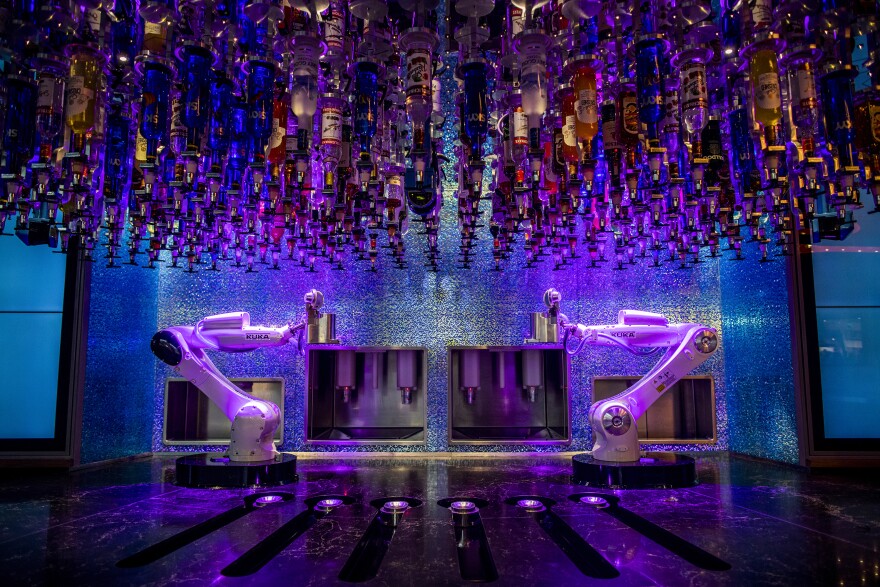At the Vdara Hotel and Spa in Las Vegas, robots are at the front line of room service. "Jett" and "Fetch" are delivery robots, designed to look like dogs, each about three feet high.
They can bring items from the hotel's cafe right to your room. Among their many capabilities, they can travel alone across the lobby, remotely call for an elevator, and even alert guests when they arrive at their hotel room through an automated phone message.
It's not just Vdara that's experimenting with this technology. Other Las Vegas hotels, including the Renaissance Las Vegas, are using automation to cater to customers' needs. So too was the Mandarin Oriental before changing over to the Waldorf Astoria this summer. And at bars like the Tipsy Robot, it's the machines that are making the drinks.
It's a growing trend that could mean big changes for the 300,000 people who work in the city's gaming and hospitality industries. A recent study by the Institute for Spatial Economic Analysis (ISEA) found that two-thirds of all jobs in Las Vegas will most likely be automated by 2035.
At the Vdara, Jett and Fetch play a small part of a bigger strategy. Cliff Atkinson, senior vice president for hospitality at MGM Resorts International, which manages the Vdara, says automation can help transform the industry as many guests demand more of a customized experience.
"I see it as we eliminate front desks altogether and that you're able to check in over your phone," Atkinson says. "But the people that were at those front desk are still there. They're there to customize your journey, there to greet you at the car and they're there to escort you to your room to make sure you have everything you need. You can't replace that and that engagement."


Atkinson sees technology as an opportunity to retrain employees. Goodbye front desk agent, hello "lobby ambassador."
But according to the ISEA study, automation will most likely hit Las Vegas in the places most visitors don't see — like the back offices and fast food kitchens. Johannes Moenius, an economist at the University of Redlands, coauthored that research.
"Women will most likely be hit first," said Johannes Moenius, an economist at the University of Redlands and coauthor of the ISEA study. And, given the makeup of the hospitality industry, minorities are also at risk of losing their jobs first, said Moenius.
That's why the Culinary Union — which represents about 57,000 hospitality workers in Las Vegas, the majority of them women and Hispanic — made it a point to include language in its latest contract to protect its members from automation.
Geoconda Arguello Kline, secretary-treasurer of the union, helped negotiate those protections between the union and the casinos. Arguello Kline says workers whose jobs are changed by automation will be given retraining opportunities. Workers who leave their jobs get severance pay and benefits for sixth months.
"Now, the workers say they have the opportunity to get the training, to learning something new," she says, "At the same time, the workers, they will say, 'You know, I don't want this. This is not for me, but I have a choice.'"
Under the contract, the union is also given up to 180 days notice before a new technology is implemented. And that is already being seen in some hotels where workers who chopped salad have been replaced by automation.
Some automation is bringing in more employees. Take, for instance, The Tipsy Robot, a bar equipped with two robot bartenders that can make drinks with its robotic arms as orders come in from a tablet. No more questions on how to make the perfect Manhattan.
Victor Reza Valanejad is the venue's general manager and says not only is business growing, he's hiring more humans to help operate the robots.
"Believe me. It's not going to take any job," Valanejad says.
Others, like Arguello Kline, are more cautious in their view of the changing landscape.
"Right now, it feels like we're protected for the next five years," she says. "But in this five years we have to prepare for the next five years, what's going to happen."
Copyright 2021 NPR. To see more, visit https://www.npr.org.






